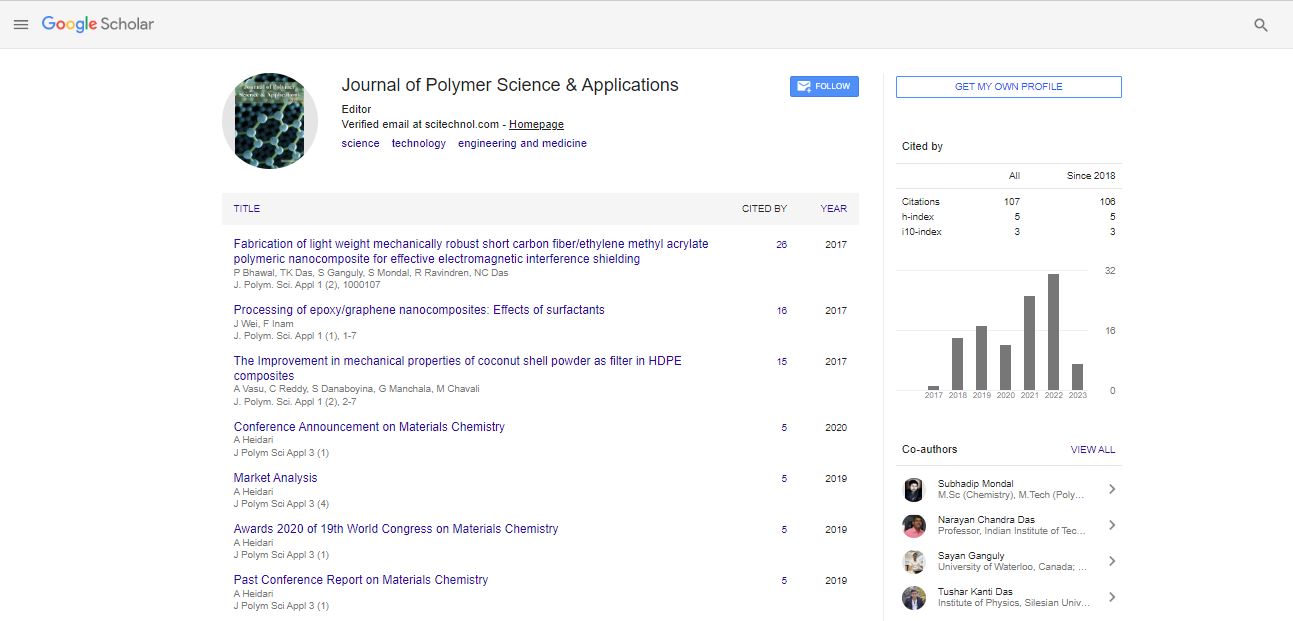Short Communication, J Polym Sci Appl Vol: 7 Issue: 2
Polymer Sustainability: Current Insights into Circular Economy Polymer Recycling
Rick Sebastian*
Department of Biochemistry and Molecular Biology, Michigan State University, Michigan, USA
*Corresponding Author: Rick Sebastian
Department of Biochemistry and Molecular Biology
Michigan State University, Michigan, USA
E-mail: sebastianrick@gmail.com
Received date: 15 May, 2023, Manuscript No. JPSA-23-106519;
Editor assigned date: 17 May, 2023, PreQC No. JPSA-23-106519 (PQ);
Reviewed date: 01 June, 2023, QC No. JPSA-23-106519;
Revised date: 08 June, 2023, Manuscript No. JPSA-23-106519 (R);
Published date: 16 June, 2023, DOI: 10.4172/Jpsa.1000143
Citation: Sebastian R (2023) Polymer Sustainability: Current Insights into Circular Economy Polymer Recycling. J Polym Sci Appl 7:2.
Description
The increasing global concern about plastic waste and its impact on the environment has led to significant advancements in polymer recycling technologies. As the world moves towards a more sustainable future, the development of innovative recycling methods is important to establish a circular economy [1]. Polymer recycling has seen significant advances in recent years strive towards a circular economy, where materials are used and reused in a closed-loop system. These advances are aimed at improving the efficiency and effectiveness of polymer recycling processes while addressing the challenges associated with traditional recycling methods [2].
Chemical recycling
Chemical recycling has emerged as a promising approach to tackle the challenges associated with traditional mechanical recycling. This method involves breaking down polymers into their monomer building blocks, enabling the production of virgin-like materials for new applications. Recent advancements in chemical recycling techniques have expanded the range of plastics that can be effectively processed, including multilayer and mixed plastics [3]. Technologies such as pyrolysis, depolymerization, and solvent-based processes have shown promising results, enabling the recovery of high-quality monomers and valuable chemical feedstocks [4].
Enzymatic recycling
Enzymatic recycling has gained attention as an eco-friendly solution for polymer degradation. Researchers have discovered enzymes capable of breaking down specific types of plastics, including Polyethylene Terephthalate (PET). By harnessing the power of these enzymes, it becomes possible to selectively degrade plastics into their constituent monomers or oligomers, which can then be used to produce new polymers [5]. Enzymatic recycling offers advantages such as mild reaction conditions and high specificity, resulting in a reduced environmental footprint compared to traditional recycling methods.
Advanced sorting technologies
Efficient sorting of plastic waste is major for effective recycling. Recent advances in sorting technologies, such as optical sorting and Artificial Intelligence (AI)-based systems, have significantly improved the accuracy and efficiency of plastic waste separation [6]. Optical sorting uses sensors to detect and sort plastics based on their material properties, color, and shape [7]. AI-based systems employ machine learning algorithms to automatically identify and categorize different types of plastics. These technologies enable higher recycling rates by enhancing the purity of recycled materials, reducing contamination, and facilitating the production of high-quality recycled polymers [8].
Biodegradable polymers
The development of biodegradable polymers offers an alternative to traditional plastics, reducing the environmental impact of plastic waste [9]. Recent advancements have focused on creating biodegradable materials with desirable properties, such as mechanical strength and thermal stability. Polymers derived from renewable sources, such as Polylactic acid (PLA) and Polyhydroxyalkanoates (PHA), have gained popularity due to their biocompatibility and potential for various applications [10]. Furthermore, innovative approaches like compostable packaging have been introduced to facilitate the recycling and biodegradation of these materials, promoting a circular economy.
Conclusion
The recent advancements in polymer recycling technologies present a significant step forward in our journey towards a circular economy. Chemical recycling and enzymatic recycling methods offer promising pathways to efficiently process a broader range of plastics, promoting the reuse of valuable resources. Advanced sorting technologies and biodegradable polymers contribute to the sustainability of recycling processes and reduce the environmental impact of plastic waste. These innovations, coupled with public awareness and supportive policies, will play a vital role in transforming the current linear plastic economy into a closed-loop system, where waste is minimized, and resources are maximized. By embracing these advances, we can work towards a more sustainable and greener future.
References
- Chen L, Pilania G, Batra R, Huan TD, Kim D. Polymer informatics: Current status and critical next steps. (2021) Mater Sci Eng RRep 144(11): 100595.
- Audus DJ, Pablo JJ (2017) Polymer informatics: Opportunities and challenges. ACS Macro Lett 6(5): 1078–1082.
- Adams N, Rust MP (2008) Engineering polymer informatics: Towards the computer-aided design of polymers. Macromol Rapid Commun 29: 615–632.
- Kuennet C, Schertzer W, Ramprasad R (2021) Copolymer informatics with multitask deep neural networks. Macromol 54: 5957–5961.
- Rajan C , Tran H, Chen L (2021) Polymer informatics with multi-task learning. Patterns 2(4): 100238.
- Doan TH, Chiho K, Lihua C , Shruti V, Jordan PL et al (2020) Machine-learning predictions of polymer properties with polymer genome. J Appl Phys 128(17): 171104.
- Chen G, Tao L, Li, Y (2021) Predicting polymers’ glass transition temperature by a chemical language processing model. Polymers 13 (11): 1898.
- Pilania G, Iverson CN, Lookman T, Marrone BL (2019) Machine-learning-based predictive modeling of glass transition temperatures: A case of polyhydroxyalkanoate homopolymers and copolymers. J Chem Inf Model 59 (12): 5013–5025.
- Kuenneth C, Jessica L, Babetta L, Carl N, Rampi et al (2022) Bioplastic design using multitask deep neural networks. Commun. Mater 3: 96.
- Barnett JW (2020) Designing exceptional gas-separation polymer membranes using machine learning. Sci Adv 6(20).
 Spanish
Spanish  Chinese
Chinese  Russian
Russian  German
German  French
French  Japanese
Japanese  Portuguese
Portuguese  Hindi
Hindi 